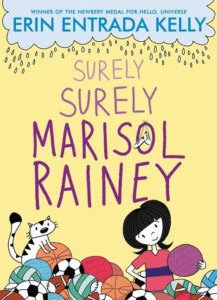“Understand the Rules, Then Forget Them”
I run a kids book club at my local library. It’s for ages eight to twelve. Each month, we read and discuss a middle grade book then complete a related activity. After we read The Year I Flew Away by Marie Arnold, we created a mural inspired by Haitian art. For Jennifer L. Holm’s The Lion of Mars, one of the students crafted a clay astronaut. To celebrate Gregor the Overlander by Suzanne Collins, we excavated bugs.
One afternoon, as we prepared to discuss Dan Santat’s The Aquanaut, I pulled paper and pencils out of my bag. One of the young readers, Anthony, wrinkled his nose.
“Oh, no,” he said. “We’re not gonna write, are we?”
As a lifelong writer, it’s difficult for me to imagine not wanting to write. But over the years I have come to accept a disappointing reality: A lot of kids really hate writing. For them, it feels like work.
“I’m not good at it,” Anthony said. With a tilted whine to his voice, he added: “I haaaate writing.”
While it’s true that some young people hate writing, will forever hate writing, and will instead excel in some other trade or craft, it’s my mission, as a lifelong wordsmith, to make them hate it a little less.
One of the ways to do that is to eliminate all the qualities about writing that feel like work. Anything that shackles them. Anything that limits their imagination. When our goal is to simply create something, without worrying whether it’s grammatically correct or good or even readable, we are suddenly free to make mistakes. And if there’s one thing I know about young people—they don’t like making mistakes. It’s the mistakes that often prevent them from trying. It’s the mistakes that make them think they’re not good at something.
What if we limit the possibility of error? What if we create simply for the joy of creating?
Here are a few things I’ve done with students.
- Toss the rules. Give students a writing prompt and encourage them to respond however they want. Tell them not to worry about any rules of grammar or spelling. They won’t be graded on either. In fact, they won’t be graded at all. It will be a ten-minute writing sprint and that’s it. Afterward, give them the freedom of choice: They can keep what they wrote, share it with a friend, or toss it in the trash.
- Encourage storythinking. When you read books together, stop at the end of each chapter and ask them what they think will happen next. If too many students answer at once, take differing answers from two or three students then take a poll with the rest of the class. If you want to incorporate writing, ask your students to write one or two sentences with their predictions. They don’t need to show their predictions to anyone if they don’t want to.
- Encourage storytelling. When you finish reading a chapter or a book, ask them how they would have written it to make it more interesting. I ask my book club these questions all the time. Their answer is almost always the same: “More dragons.” In their opinion, dragons always make things more interesting. If your students say “more dragons,” your instinct may be similar to mine—you’ll find yourself explaining why dragons aren’t logical in a story like Charlotte’s Web. But instead of launching into your logical explanation, why not embrace all their ideas? That’s what I did with my book club, and they were immediately engaged, firing off one idea after another, until they reached the end of their own story. For me, the importance of the moment wasn’t to force them to think critically about Charlotte’s Web. It was to get them excited about stories and all the possibilities they offer.
To develop a love of writing, we must develop a love of creativity, a love of storytelling, and an appreciation of how words create stories. Rules, logic, grammar, spelling—all of these sound like work. Because they are work. They serve a purpose, certainly, but they also confine us.
There are times when it’s okay to prioritize creativity above all else, and let the work come later. As grown-ups, we often forget that.
Published August 9th, 2022 by Greenwillow Books
About the Book: Everyone loves sports . . . except Marisol! The stand-alone companion to Newbery Medal winner and New York Times-bestselling Erin Entrada Kelly’s Maybe Maybe Marisol Rainey is an irresistible and humorous story about friendship, family, and fitting in. Fans of Clementine, Billy Miller Makes a Wish, and Ramona the Pest will find a new friend in Marisol.
Marisol Rainey’s two least-favorite things are radishes and gym class. She avoids radishes with very little trouble, but gym is another story–especially when Coach Decker announces that they will be learning to play kickball.
There are so many things that can go wrong in kickball. What if Marisol tries to kick the ball . . . but falls down? What if she tries to catch the ball and gets smacked in the nose? What if she’s the worst kickballer in the history of kickball? Marisol and her best friend Jada decide to get help from the most unlikely–and most annoying–athlete in the world: Marisol’s big brother, Oz.
Told in short chapters with illustrations by the author on almost every page, Erin Entrada Kelly’s stand-alone companion novel to Maybe Maybe Marisol Rainey celebrates the small but mighty Marisol, the joys of friendship, the power of being different, and the triumph of persevering.
About the Author: New York Times–bestselling author Erin Entrada Kelly was awarded the Newbery Medal for Hello, Universe and a Newbery Honor for We Dream of Space. She grew up in Lake Charles, Louisiana, and now lives in Delaware. She is a professor of children’s literature in the graduate fiction and publishing programs at Rosemont College, where she earned her MFA, and is on the faculty at Hamline University. Her short fiction has been nominated for the Philippines Free Press Literary Award for Short Fiction and the Pushcart Prize. Erin Entrada Kelly’s debut novel, Blackbird Fly, was a Kirkus Best Book, a School Library Journal Best Book, an ALSC Notable Book, and an Asian/Pacific American Literature Honor Book. She is also the author of The Land of Forgotten Girls, winner of the Asian/Pacific American Award for Literature; You Go First, a Spring 2018 Indie Next Pick; Lalani of the Distant Sea, an Indie Next Pick; and Maybe Maybe Marisol Rainey which she also illustrated.
Thank you, Erin, for this reminder to allow kids to write freely!


